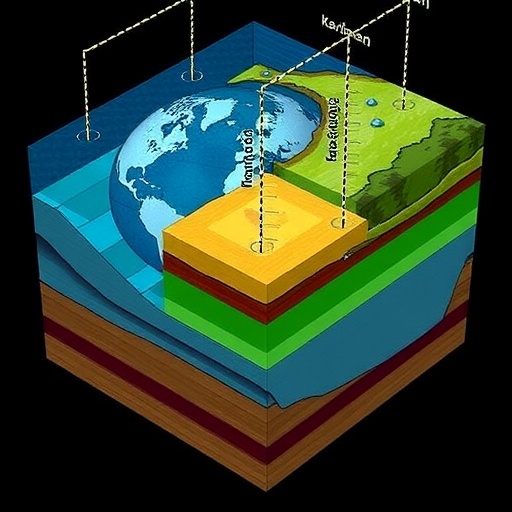Recent research has unveiled a significant connection between sea-level variations and the formation of weak layers that can precipitate submarine landslides on low-latitude continental margins. This groundbreaking study, led by Li and colleagues, sheds light on the dynamics of geological processes that could have widespread implications for our understanding of marine environments and coastal stability. As sea levels fluctuate, they can induce changes in sediment composition and structure, affecting both the stability of submerged strata and the potential for catastrophic geological events.
The research team employed a combination of field studies and advanced modeling techniques to investigate how sea-level changes influence weak layer formation. The low-latitude continental margins are particularly vulnerable to these fluctuations due to their unique geological and hydrological characteristics. The findings emphasize that as global temperatures rise and ice melts, the resulting changes in sea levels could trigger a series of geological responses that might lead to destructive submarine landslides.
The significance of submarine landslides cannot be overstated, as they pose risks not only to marine ecosystems but also to coastal communities. Landslides can generate tsunamis, disrupt shipping lanes, and damage underwater infrastructure. Hence, understanding the mechanisms that trigger such events is crucial for predicting and mitigating their impacts.
A critical aspect of the study involved examining the conditions under which weak layers form in sediment deposits. These weak layers are often composed of fine-grained sediments that can become unstable when subjected to increasing pressure or changing hydrodynamic conditions. The researchers observed that during periods of rapid sea-level rise, the deposits could become saturated, significantly increasing the likelihood of failure.
Furthermore, the study highlights the role of sediment dynamics in the context of climate change. As ice sheets continue to melt due to rising global temperatures, the influx of freshwater into the oceans alters the salinity and density gradients, which impacts sediment transport and deposition processes. The resulting changes could destabilize existing structures on continental margins, leading to more frequent and severe landslides.
The implications of these findings extend beyond academic research; they present a call to action for policymakers and coastal planners. With the increasing threat of climate-induced geological hazards, it is vital to establish more robust monitoring programs and risk assessment frameworks. Such measures could help coastal communities adapt to and mitigate the impacts of changes in sea levels and related geological phenomena.
While the research focused on low-latitude regions, the principles observed may apply to other continental margins worldwide. As sea levels continue to rise globally, understanding the nuanced interplay between hydrology, sediment dynamics, and geological stability is imperative. The study encourages further research in diverse geographical contexts to develop a comprehensive understanding of submarine landslide triggers and the broader implications for marine environments.
In conclusion, the research presents a compelling narrative about the interconnectedness of climate change, sea-level variations, and geological stability. By elucidating the mechanisms of weak layer formation and submarine landslides, this study contributes essential knowledge to the fields of geology, oceanography, and environmental science. As such, it opens new avenues for research and emphasizes the urgent need for interdisciplinary approaches to tackle the challenges posed by a changing climate.
In the years to come, the scientific community will likely build upon these findings to enhance predictive models of geological activity in coastal regions. The research not only serves as a scientific milestone but also as a crucial reminder of humanity’s intricate relationship with the Earth’s systems. As we strive to navigate the complexities of climate change, understanding these geological processes may prove key to developing resilient coastal strategies and safeguarding vulnerable populations.
The continuing exploration of weak layers and their role in submarine landslides remains a priority for researchers. The complexities of sediment behavior under various environmental stressors will need further investigation, particularly in light of ongoing climate shifts. By advancing our knowledge in this area, we may better equip ourselves to confront the geological and environmental trials of the future.
Moreover, the engagement of the public and stakeholders in understanding these phenomena is essential. Increased awareness of the risks associated with submarine landslides and the influence of climate change could galvanize support for sustainable practices and policies designed to protect our coasts and oceans. The compelling evidence presented in this study empowers the narrative for action in the face of profound environmental challenges.
As we continue to grapple with the reality of climate change, this research stands as a crucial piece of the puzzle, reminding us that the sea is not just a distant entity but a dynamic and evolving force that shapes our world. Our approaches to marine management, coastal development, and environmental stewardship must reflect this understanding, ensuring that we acknowledge and anticipate the impacts of sea-level changes on geological stability and coastal communities.
Ultimately, Li and colleagues’ research encourages a collaborative effort among scientists, environmentalists, and policymakers. By fostering an interdisciplinary dialogue, we can better comprehend the complexities of our planet’s systems and forge pathways toward resilience in the face of inevitable change.
As we move forward, let us remember that our understanding of Earth’s processes is ever-evolving. The work of researchers like Li and others serves as a foundation upon which we can build more comprehensive frameworks to respond to the multifaceted challenges posed by climate change and its effects on geological stability.
Subject of Research: Sea-level variations, weak layer formation, submarine landslides on low-latitude continental margins
Article Title: Sea-level variations influence weak layer formation and submarine landslides on a low-latitude continental margin.
Article References:
Li, W., Jing, S., Urlaub, M. et al. Sea-level variations influence weak layer formation and submarine landslides on a low-latitude continental margin. Commun Earth Environ 6, 950 (2025). https://doi.org/10.1038/s43247-025-02949-z
Image Credits: AI Generated
DOI: https://doi.org/10.1038/s43247-025-02949-z
Keywords: Sea-level variations, submarine landslides, weak layers, climate change, geological processes, coastal stability.




